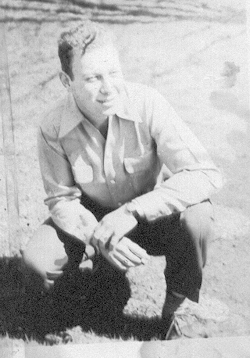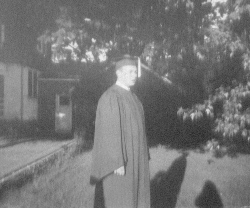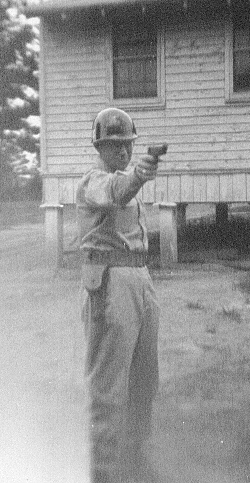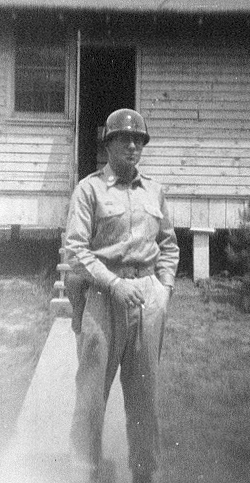|
I was fortunate to have some outstanding teachers in high school, Mr.
Barrett in math, Miss Simmons in English and Mr. Power in chemistry and
physics. Miss Simmons believed in reincarnation, and she further
believed that she was Cleopatra reincarnated. This was not a secret, as
she would proclaim it from time to time. She didn't use a text book for
grammar. She developed her own mimeographed course, which she called,
"Grammar with a Hammer". A little strange, but an excellent teacher.
Mr. Power was also an excellent teacher, but was on a temporary
teaching permit because he couldn't pass the licensing exams. He was a
very nice guy, and could explain what he knew, but had difficulty
learning new stuff. This was particularly noticeable after the atom
bombs were dropped on Japan in 1945. I was in his chemistry class and he
and the class had to learn about atomic energy at the same time.
In
one assembly program during my junior year, teachers decided to have a
quiz program of juniors against senior. I think Miss Simmons was the
instigator because she did not teach seniors, and would talk on and on
about her "brain trust". There were 8 juniors on a team against the
team of 8 seniors. Pete Poletti asked the questions. About
halfway through the match, he turned to the juniors and said, "I'll
give you 5 seconds to divide 75 by a half." I raised my hand and
shouted 150. Pete said that I was wrong. I sat there trying to figure
out what he meant when I noticed Mr. Barrett, all 6'6" of him,
unfolding himself from his seat and saying, "Pete, he's right." Each
correct answer was worth 5 points. I scored 95 out of the 190 the
juniors' total. The seniors had 225.
|

1947
|
Weldon
E. Howitt was the principal of the high school for as long as anyone
could remember, but had retired about 1944. At graduation, he gave a
$25 prize for "Advanced Physical Science". Until my senior year, it had
been given to the senior who received the highest mark on the physics
regents exam. I got 100% on my physics regents. That year, the prize
was given to the senior who had the highest regents average in
chemistry and physics. I scored only a 96 on the chemistry regents, but
Kuno Schwartz had a 98 in chemistry and a 99 in physics, so he won the
prize. Two years later, when Lee had the highest average, and
the
highest physics regents mark, the prize was given to a girl who took
chemistry in her senior year, instead of physics, and scored higher on
that regents than Lee did on physics.
When the district built a new school, it was named after Mr. Howitt. |
|

June 1947 |
I graduated. It was
assumed that I would go to college - I was a great student with
wonderful marks, my overall high school regents average was above 95%,
so how could I not go to college? But I did not want to go. I didn't
know what I wanted to do, but I did know that I didn't want college.
The idea of going to college wasn't scary, it was repellent, and I
don't know why. I was never able to even broach the subject with my
parents, so I went to the University of Michigan engineering school.
I was not interested in
engineering, but it was felt that that was where I belonged and I could
not refuse. For whatever reason, I was not housed on campus with the
freshman. I was 7 miles away in Ypsilanti in old army barracks with
upper classmen, with a U of M bus as the only transportation between
the two. It was a very unhappy situation and I did badly. In the second
semester, I moved on campus, but I had no interest in the work and I
did poorly. I never went back and I have never regretted not having a
college degree, but I'm sure that my parents were greatly disappointed.
|

1947 |
|

November 1948
Ah! The warrior and the movie star.
After my one disastrous year at
the University of Michigan, I enlisted in the army because, for one
year only, the army allowed 18 year-olds to enlist for one year and
were then exempted from the draft. |
Congress liked the one-year enlistment idea,
it was
theirs, but the army hated it. They had no programs for us and didn't
know what to do with us. The army wasn't permitted to send us overseas,
and there was nothing for us to do in peacetime in the U.S. The result
was that in my 52 weeks in the army, I went through the 8 week basic
training course 5 times. I also had 4 weeks of leadership school, a
month's worth of furloughs, and the rest of the time was just wasted.
Towards the end of my enlistment, I was assigned to the Engineering
Corps, where I learned how to use a gin pole, with and without a dead
man. I also learned how to put together a ponton bridge, but we 18 year
olds were not allowed to touch the equipment. We did learn how to chop
grass with sharpened sticks because we engineers didn't have
lawnmowers. It wasn't a bad way to spend a year, and I did enjoy the
close order drills, especially when I was the acting drill sergeant.
There were some fun times.
One of the first things
that happened after induction into the army was the taking of the Army
General Classification Test (AGCT). This was 2 three hour sessions of
multiple choice tests. Dad had a friend who was a research psychologist
at NYU. He had needed volunteers to take tests he was devising, so dad
volunteered Lee and me. From about 1944 to 46, we would go to NYU to
take tests, so I learned how to take them and how they were scored. The
AGCT was just another test to me. I listened very carefully to the
directions, and when the emphasis was on answering every question,
whether you knew the answer or not, I knew how the test would be
scored. The machine would record only incorrect answers. So, I answered
only questions when I was reasonably sure that I knew the answer. My
score was 796 out of a possible 800, which actually meant that, of the
questions I answered, I got 4 wrong.
|

|
|
The AGCT score was part of my permanent record and got
me some respect
from the non-commissioned and commissioned officers, who kept trying to
get me to sign up for officer's candidate school. I think it was also
responsible for the 3 promotions that I got in the one year.
Every soldier gets a copy of the army field manual, which is an
instruction book on how to be a soldier and the rules and regulation. I
actually read it, so I knew, at least in theory, how things were
supposed to work. So, for instance, when the platoon is standing at
attention, rifles on shoulders, and the drill sergeant orders, "Right
Face", I knew that was an illegal command, because the field manual
says that you cannot give a facing command when rifles are on
shoulders, and would therefore holler, "As you were." thereby
countermanding the order. This happened so frequently with one drill
sergeant that he started asking me which commands he could give.
|

|
I had received a furlough
in April 1949 to go home for Easter/Passover. The train left Columbus,
Georgia very late at night, and by the time I got there, it was
crowded. I got onto the first car of the 3 car train and started
pushing my way back. The second car seemed just as crowded. I kept
pushing, and miraculously, the back of the car was fairly empty. I
walked into the last car and found lots of empty seats, so I laid down
in one and went to sleep. I was awakened some time later by 2
conductors. The white one shook me awake, while the black one
just stood there. The white one told me that I would have to move to
the front of the train since the back was reserved for blacks. Came the
dawn! It was then I realized why there were so many empty seats. He
pointed to a sign which said that rule 48 of the Georgia Public Service
Commission reserves the back for blacks. I told him that since we were
going to Washington, that made it an interstate trip, the Interstate
Commerce Commission had no such stupid rule, and I refused to move.
They went away and I went back to sleep. We were near Washington when I
woke, the car was full of white people and the train was 8
cars long. Apparently, when they added cars, they made the blacks move
back.
One summer day, at Fort
Benning, Georgia, our platoon was out in the
field using sharpened sticks to cut grass, when a runner arrived with
orders for me to get into my Class A uniform and report to a lieutenant
in a company classroom. I rushed back to the company area, showered,
changed and reported to the lieutenant. He asked
me the speed of
light, I told him, he thanked me and told me to go back to whatever I
was doing before.
In late September, 1949, about three weeks before I was to be
discharged, I was put up for promotion and was told to report to the
battalion commander, a major I didn't know. This was to be my
interview for the promotion. He started by questioning me on
engineering topics - gin poles, trenching equipment, bridges, etc. I
wasn't able to answer all of his questions. Then he asked if
I knew the binomial expansion theorem and the quadratic formula. I told
him I did. He asked me to explain them since he was going to take a
test for a promotion and he just couldn't understand them. We worked
on them for a while until he got them. He then told me that he was
going to approve my promotion, not because I knew anything of benefit
to the army, but because I was a good boy. |
|
 
|
|